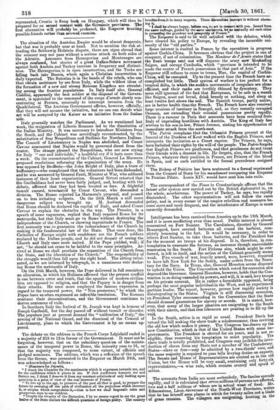The situation of the Austrian Empire would be almost desperate,
but that war is probably near at hand. Not to mention the risk at- tending the Schleswig Holstein dispute, there are signs abroad that the summer may not pass without a serious attack on both sides of the Adriatic. Accounts from Herzegovina and Montenegro are always confused, but stories of a great Italian-Sclave movement against both Austria and Turkey increase in frequency and distinct- ness. The Herzegovina is in open insurrection, and the Turks are falling back into Bosnia, where again a Christian insurrection is daily expected. The Sutorina is in the hands of the rebels, who can thus obtain assistance by sea from Italy, while the wildest ideas of the formation of a new and strong Roman Kingdom are circulat- ing among the frontier populations. In Italy itself also, General Cialdim, apparently the best soldier at the disposal of the Govern- ment, is appointed to the command of the corps d'armee slowly con- centrating at Ferrara, nominally to intercept invasion from the Quadrilateral. The Austrian Government affirms, however, officially, that they will not assume the initiative, but no one can decide what act will be accepted by the Kaiser as an initiative from the Italian aide.
Italy generally watches the Parliament. As we mentioned last week, the resignation of Liborio Romano led to the dissolution of the Italian Ministry. It was necessary to introduce Ministers from the South, and the Cabinet was accordingly reconstructed, by the substitution of four Neapolitans and Sicilians for Northern Italians. The Council of Lieutenancy in Naples was abolished, and Count Cavorts announced that Naples would be governed direct from the centre. The change pleased the Neapolitans, who are now crying for Italy "one and indivisible," a healthful cry if it lasts more than a week. On the reconstruction of the Cabinet, General La Marmora proposed resolutions reforming the organization of the army. He was opposed by Brofferio—the John Bright of Italy, plus a trace of buffoonery—who complained that the volunteers had been disbanded, and he was answered by General Falai, Minister at War, who adduced instances of their loose organization. General Sirtori retorted that the Garibaldians had never been fairly judged, and, heating with the debate, affirmed that they had been treated as foes. A frightful tumult ensued, terminated by Count Cavour, who demanded a division. The House rejected La Marmom's proposal, and passed on to less irritating subjects. On the 25th March a still more dangerous subject was brought up. M. Audinot demanded that Rome should be declared the capital of Italy, and asked Count Cavour to explain the obstacles in the way. Yhe Premier, in a speech of some vagueness, replied that Italy required Rome for its metropolis, but that Italy must go to Rome without destroying the independence of the Church, or showing ingratitude to France. The first necessity was to guarantee the independence of the Church by making it the fundamental law of the State. That once done, the Cathohc,s of Europe might with confidence see the French soldiers replaced by the Italian people, and he did not despair of seeing the Church and Italy once more united. If the Pope yielded, well; • if not, "he should not cease to be faithful to the same principles. Ar- rived at Rome we shall proclaim the separation of the Church from the State, and the liberation of the Church." The responsibility of the struggle would then fail upon the right head. The sitting termi- nated, as we are informed by telegraph, in a unanimous vote declar- ing Rome the metropolis of Italy.
On the 18th March, however, the Pope delivered in full consistory an allocution, in which his Holiness affirmed that the present conflict is one between error and truth, that the apostles of modern civiliza- tion are opposed to religion, and that the Papacy is in danger from their attacks. He once more employed the famous expression in regard to the temporal power, the "Non possumus," by which the Popes have so often expressed an inflexible resolution. The Romans continue their demonstrations, and the Government continues to decree sentences of exile.
In Southern Italy the festival of St. Joseph was kept in honour of Joseph Garibaldi, but the day passed off without tumult or disorder. The populace just at present demand the "unification of Italy," the arming of the National Guard, and the dismissal of the Council of Lieutenancy, plans to which the Government is bp no means op- posed.






























 Previous page
Previous page